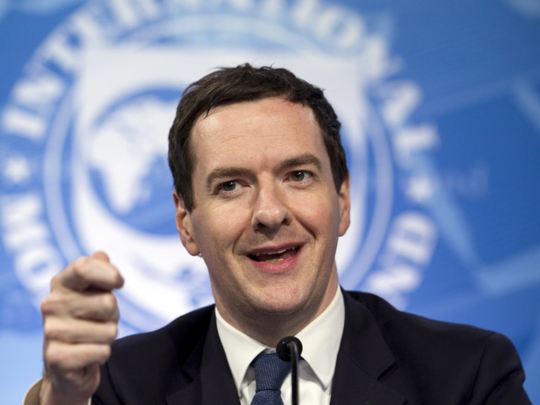
In which tinpot country would a former finance minister and senior politician of the governing party be handed the editorship of the capital’s newspaper? In what cut-price Ruritania would that story be broken on the state broadcaster by the former right-hand man of the newspaper’s proprietor? On what broken-backed island would that same politician brazenly announce plans to edit the paper in the morning, represent his constituency (over 100 miles away) in the afternoon, all the while working for a giant investment fund one day a week, and squeeze in some after-dinner speaking on the odd evening? You already know the answers.
Everything I’ve just described happened in Britain, in the motherland of parliamentary democracy, on Friday. At least in banana republics they grow their own bananas. Joke all you like about George Osborne being made editor of the Evening Standard. Satire is, after all, the last refuge of the powerless. But once the gags peter out, the fact remains: His appointment is bad for the press, for politicians and for democracy.
The fundamental job of any free press is to hold power to account. This recruitment blows that idea out of the water. How will the London Evening Standard scrutinise a government when it’s run by a man who less than a year ago was its de facto number two — and who remains an MP for the ruling party? In the financial capital of the world, how much credibility will the Standard’s City pages command when their ultimate editor is in the pay of a giant fund manager? And how is journalism ever going to become an industry that represents its audience if one of its plum jobs can be lobbed by the son of a Russian oligarch into the lap of a public schoolboy who has never subbed, reported or edited?
Those politicians who were not lining up on Friday to congratulate Osborne can surely see how bad this looks for their kind. Ever since MPs’ expenses, the political elite has had to fight hard the charges that Westminster is just a giant feeding trough. Their efforts have been rendered effectively useless by the former chancellor. The 45-year-old has treated his time in government as an elongated gap year — time served to give him the CV points to go off and make big-money speeches on Wall Street and land a part-time job in the industry he was meant to be regulating.
For six years, Britain was governed by public schoolboys who were useless at almost everything apart from handing cash to their mates in the City and the house-building industry. They boasted of competence, yet tanked the economy so badly that British workers are suffering their worst decade for pay since the Napoleonic wars. They claimed to be compassionate, yet Osborne and his colleagues snatched money off the poor and sent disabled people to their deaths. The believers in free markets called and bungled the referendum that will drag Britain out of the EU. The Conservative and Unionist party has done an admirable job of smashing up the union.
It was a government of Michael Gove and Andrew Lansley, Jeremy Hunt and Boris Johnson. It was an administration of bunglers, chancers and the shameless; it has done huge damage to the relationship between the political elite and the public. And at its centre was Osborne, the tactician-in-chief, the man who cut taxes on multinationals even while he lifted benefits off disabled people. His reward? To be handed more money by the mates who got most out of him while in office.
The public-school larceny might make you angry; the lack of effective oversight should make you despair. Osborne’s new job must be agreed by parliament’s advisory committee on business appointments, which is meant to regulate the jobs taken up by former ministers. This is the same watchdog that allowed Gove to go back to work for Rupert Murdoch, former health secretary Lansley to take money from drugs firms and the ex-water minister, Richard Benyon, to take on £1,000 (Dh4,553) a day in the water industry.
Dress it up in ceremonial robes, but this is class privilege writ large and made all the more glaring by being pursued by politicians who bang on about a “fair crack” and the need for social mobility.
From banking to the press to Westminster, Britain’s elites have shown themselves to be both unreformed and unreformable. In each sector, their leading individuals keep on bending the rules and raking it in, even when collective self-interest should be telling them to stop. The public may not follow every headline, every appointment, every twist and turn, but they know when they’re being laughed at.
— Guardian News & Media Ltd
Aditya Chakrabortty is senior economics commentator for the Guardian.









